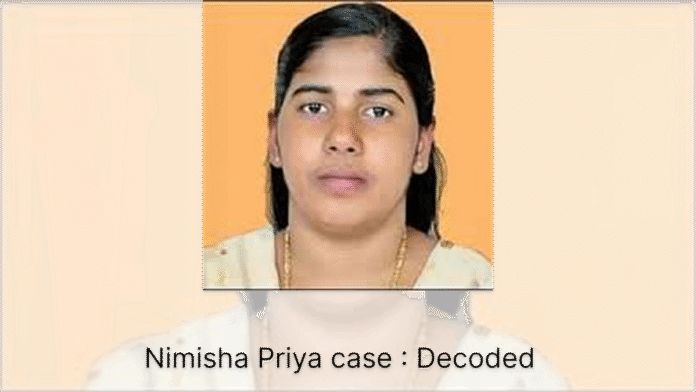The case of Nimisha Priya, a nurse from Kerala, has captured national and international attention. What began as a story of migration for a better life turned into a tragic legal battle in a foreign land. Sentenced to death in Yemen for the murder of a local man, Nimisha now awaits her fate under the strict rules of Islamic law (Qisas). With her execution postponed and diplomatic efforts underway, the world watches as her supporters, family, and Indian authorities try to save her life through negotiation, blood money, and prayers for forgiveness. This case is not just about crime and punishment—it’s about justice, culture, law, and the hope for a second chance.
Here’s a detailed breakdown of the Nimisha Priya case, one of the most closely watched international legal crises involving an Indian national:
- Who is Nimisha Priya?
She is a nurse from Kerala who moved to Yemen in 2008 for work. - What happened?
She started a clinic with a Yemeni man named Talal Abdo Mahdi.
He allegedly abused her, took her passport, and lied about being married to her. - The incident
In July 2017, Nimisha tried to get her passport back by giving Mahdi an injection (ketamine).
He died from the drug, and his body was later found in a water tank. - Arrest and Trial
She was arrested in August 2017.
She went through a trial in Arabic (which she does not understand), and had no proper lawyer or interpreter. - Death Sentence
In 2020, a Yemeni court sentenced her to death.
Her appeals were all rejected by November 2023. - Hope through Islamic Law (Qisas)
Under Islamic law, the victim’s family can:- Ask for the death penalty (Qisas), or
- Accept blood money (Diyya) and forgive the accused.
- Negotiations and Fundraising
Talks began in mid-2024 to pay compensation.
About $40,000 was raised by supporters and sent to Yemen. - Government and Religious Help
- The Indian government is trying to help her.
- Religious leaders from India and Yemen are also working to convince the victim’s family.
- Execution Delayed
Nimisha was supposed to be executed on July 16, 2025,
but Yemen postponed it on July 15, after pressure from India and religious leaders. - Challenges in Getting Forgiveness
- The victim’s family has refused any money or forgiveness.
- They want full punishment as per religious law.
- Negative social media posts from India have made things worse.
- India has no embassy in Sanaa (Yemen’s capital), making it harder to communicate.
- In Yemen, many family and tribal leaders must agree for any pardon.
- Current Status (as of July 2025)
- Execution is still on hold, but not canceled.
- Talks are still going on.
- The Action Council and supporters are hopeful.
- Money is ready, but the family’s refusal remains the biggest problem.
